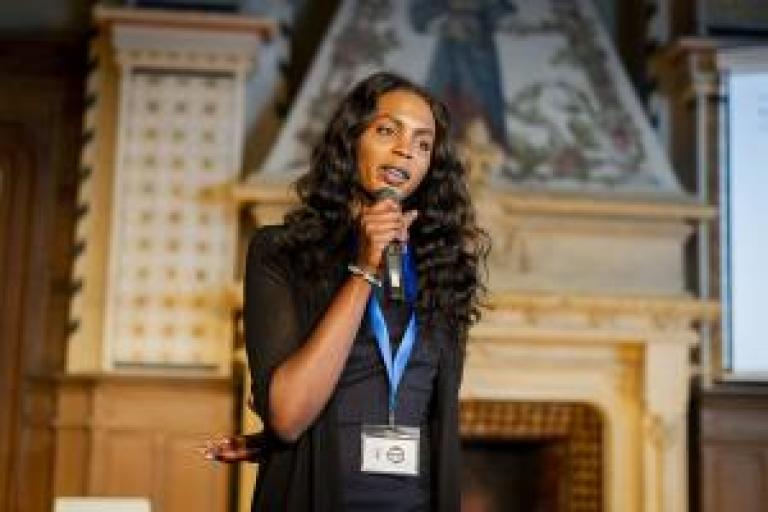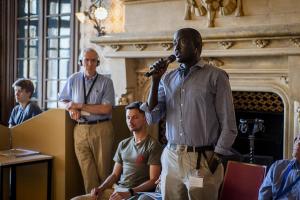IofC Australia sponsored two South Sudanese-Australians to go to peacebuilding conferences in Caux this year. Monica Deng and Gatluak Puoch attended the Tools for Changemakers program from 14-18 July 2019 at IofC’s global centre in Switzerland.
‘I had to let go to move on’

Monica, a pharmacist and community organizer with the South Sudanese Auastralian Youth United (SSAYU) says:I was born in Nairobi, Kenya, of Dinka parents from South Sudan’s largest tribal group. My parents were displaced during the war in South Sudan in the early 1980s. They were refugees in Kenya until setting in Australia in the early 2000s.
South Sudan is a nation that has experienced so much bloodshed. The war that displaced my parents lasted for 21 years, until in 2005 a peace agreement was signed. In 2013, conflict broke out again in South Sudan, and many people lost their livesas a result. To this day, we are getting reports of relatives losing their lives or becoming displaced from their homes.
In June 2018, my mother learned of the brutal death of her young cousin in Juba, South Sudan. This young man, who was in his late 20s, had recently moved to Juba to pursue his university studies. One day while travelling on the bus, a group of Equatorian men ambushed the bus and brutally tortured and murdered every single person on the bus who was from the Dinka tribe. My mother’s cousin was one of the victims on the day. His skull was completely crushed and left opened. Photos of his brutal murder were sent to us in Australia. I was completely appalled by the images of his death and I decided not to think, hear or speak of it again.
During my second day at Caux, I was informed that a general from South Sudan would be coming to Caux for lunch, and I was welcomed to join in. This general is from the Equatorian tribe that was responsible for an uprising in Juba,hich may have have been linked to the death of my mother’s cousin.
Once I discovered the connection, I broke down and cried. I just realized how things happening in South Sudan were actually having an impact on me. I made the decision to join the general and a few others over lunch as I was interested to hear from his perspective.
The meeting went for over five hours and I learnt so much from the general about what is happening in South Sudan, and why he has taken his stance. Afterward, during my personal prayer time, I recognized that the tribal conflict currently happening in South Sudan is having a direct impact on me. The emotional impact is still fresh in our hearts. I realized that I had bitterness and prejudices towards other non-Dinka South Sudanese, which I had to let go in order to move on.
I went to Caux not knowing exactly what to expect but I left feeling much more whole as a human being, as I was able to let go of hurts and pains that were in my heart that I was totally unaware of. I discovered how important it is to see everyone as equal human beings despite their religion, race, and tribe.
‘Forgiveness…without justice having to be served’

Gatluak, an advisor to the State Government of Victoria and father of three young sons and a daughter, says:I was separated from my parents during the time of war in South Sudan. Kids were recruited in the army and so was I. I landed in a refugee camp in Ethiopia, and this is where I did my schooling until 1995. I came to Australia on my on during my teen years.
The civil war in South Sudan has claimed more than 15 lives from among my own family members and friends. The conflict has caused displacement among my family, and most are wounded in some way – physically, mentally and psychologically.
Since the 2013 conflict in South Sudan, I was bitter. I supported ways which, I felt, would truly bring the murderers to justice. However, on 17 July 2019, while at Caux, my view changed.
One of the IofC leaders, Mike Brown, invited me to watch a film, Beyond Forgiving, with a military leader from South Sudan, whose armed force was actively fighting in the civil war. I was hit in the face so hard by this South African documentary. (See a trailer of this film, about a South African mother who sought out her daughter’s politically-motivated killer, and then proceeded to forgive him and work with him for peace.) The film provided me with the courage to embrace the art of forgiving those who have wronged me, without justice having to be served. It encouraged me to reflect on my co-responsibility in a situation that went wrong.
Since my return from Caux, I participated in several conversations about restorative justice with my peers, community members, family members and friends. In those conversations, I have encouraged people to reflect on their own conduct that might have contributed to ongoing injustice in South Sudan.
Prior to attending the conference, I used to believe that changes and new histories are mostly initiated by rich or powerful people. In Caux, I learned that making a history is not necessarily the monopoly of the rich or powerful. Anyone is capable of initiating change.
Tools for Changemakers takes place every year in Caux for grassroots workers active in community and trust building. The program unwraps the links between personal and collective identities, acknowledges collective trauma, and builds trust and cohesion among community. For more information, contact Mike Brown.

